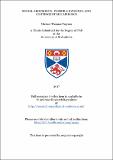Files in this item
Modal arguments, possible evidence and contingent metaphysics
Item metadata
| dc.contributor.advisor | Hawley, Katherine (Katherine Jane) | |
| dc.contributor.advisor | Cotnoir, A. J. | |
| dc.contributor.author | Traynor, Michael Thomas | |
| dc.coverage.spatial | 234 p. | en_US |
| dc.date.accessioned | 2018-07-19T14:23:22Z | |
| dc.date.available | 2018-07-19T14:23:22Z | |
| dc.date.issued | 2017 | |
| dc.identifier.uri | https://hdl.handle.net/10023/15595 | |
| dc.description.abstract | The present work explores various ways in which contingent evidence can impact metaphysics, while advocating that, just as a scientific realist allows for ampliative inferences to the unobservable, ampliative inferences from possible evidence can warrant possibility claims that lie beyond the reach of sensorial imagination. In slogan form: possible evidence is a guide to possibility. Drawing on Shoemaker’s (1969) argument for the possibility of time without change, I advocate the following principle: If there is a possible world at which the observable facts make it objectively reasonable to conclude that p, then we should conclude that p is possibly true. This provides a route to contingentism in metaphysics, for, if one considers that there are worlds in which the observable facts make it objectively reasonable to conclude that p, and worlds in which the observable facts make it objectively reasonable to conclude that not-p, then my principle tells us that we should conclude that possibly-p and possibly not-p, i.e. that p is contingent. This contingency in what is reasonable to conclude, I suggest, occurs most saliently in debates where evidence of phenomenal experience and empirical science are marshalled to support one theory over another. I also explore some consequences of taking possible evidence to be a guide to possibility in this way, among them being an interesting modal analogue of the lottery paradox. | en_US |
| dc.language.iso | en | en_US |
| dc.publisher | University of St Andrews | |
| dc.subject.lcc | BD111.A4T8 | |
| dc.subject.lcsh | Metaphysics | `e |
| dc.subject.lcsh | Contingency (Philosophy) | en |
| dc.title | Modal arguments, possible evidence and contingent metaphysics | en_US |
| dc.type | Thesis | en_US |
| dc.contributor.sponsor | Arts and Humanities Research Council (AHRC) | en_US |
| dc.contributor.sponsor | Royal Institute of Philosophy | en_US |
| dc.type.qualificationlevel | Doctoral | en_US |
| dc.type.qualificationname | PhD Doctor of Philosophy | en_US |
| dc.publisher.institution | The University of St Andrews | en_US |
This item appears in the following Collection(s)
Items in the St Andrews Research Repository are protected by copyright, with all rights reserved, unless otherwise indicated.

